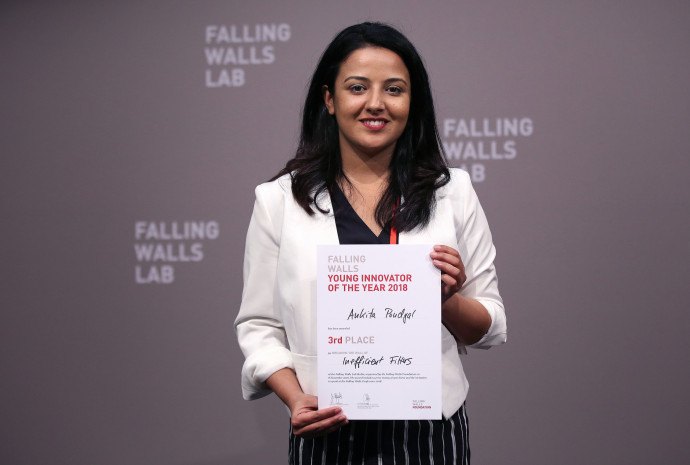News
Published 14 November 2018Third place in Berlin for Falling Walls New Zealand Lab winner

Auckland University of Technology's Ankita Poudyal, winner of the 2018 Falling Walls Lab New Zealand, won third place in the international finale event held in Berlin on 8 November with her presentation 'Breaking the Walls of Inefficient Filters'.
Ankita Poudyal won third place with her presentation on her work with nano-fibre filters that efficiently remove particles and enable good air flow with the help of surface coating technology. These two functions are mutually exclusive in conventional filters.
She was up against 100 participants selected in 77 Falling Walls Labs, held in 57 countries. As one of the top three, Ankita was invited to give her presentation again alongside the two other place winners at the Falling Walls Conference the next day, which was attended by over 700 people at €1000 per ticket.
The Falling Walls Lab Conference hosts 20 world-class researchers from all disciplines and parts of the world who each showcase the breakthroughs they are working on in 15-minute talks. Among the speakers are Nobel laureates, artists, heads of states and government officials. The conference attracts an audience from over 80 nations and is covered by the media globally. It is considered to be one of the foremost places of high-level exchange between science, business and other sectors of society.
Originally from Nepal, Ankita was selected earlier this year from 19 early career researchers competing from New Zealand and the Pacific, who pitched their ideas at the New Zealand Falling Walls Lab held by Royal Society Te Apārangi in September, with support from the German Embassy in Wellington, Royal Society Te Apārangi Early Career Researcher Forum and the German-New Zealand Chamber of Commerce.
The winner of the international Lab Finale event in Berlin was Ahmed Ghazi from the University of Rochester's Medical Centre, for 'Breaking the Wall of Surgical Errors'. Ahmed developed 3D-printed injection molds used to create intricate realistic human organs. These models can be used for doctors to rehearse surgeries and reduce the rate of surgical errors.
Second place went to Adam Fulop from the Budapest University of Technology. Adam's reading glove converts printed text into braille in realtime, making printed text accessible to blind and partially sighted people.
The winners of the Lab Finale in Berlin were selected by a distinguished jury of scientists and entrepreneurs,
headed by the astronaut and former French research minister Dr Claudie Haigneré.
"We have been impressed and inspired by the participants' strength of conviction to push for breakthroughs; they gave us hope this afternoon for the future with the diversity of their proposals," says Dr Haigneré.
Ankita's presentation can be viewed below in the Facebook Live recorded video of the Lab Finale at 2:38:15
